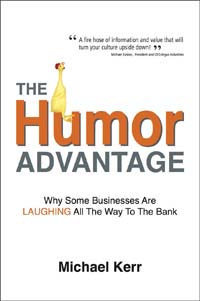The following is an excerpt from Michael Kerr’s latest book, The Humor Advantage: Why Some Businesses Are Laughing All the Way to the Bank.
“Why do we have fun at work? Because work is hard enough as it is without making it any harder!” Mike Easton, CEO Argus Industries 
Humor in the workplace is the Rodney Dangerfield of human resources management. Like the late, tie-tugging, fidgeting comedian, the topic doesn’t get much respect.
Humor as a competitive advantage isn’t, after all, taught in most MBA programs.
Clown school? Possibly.
Community college improv course? You betcha.
But business school? Not so much.
Because of the nature of humor and its seemingly diametric opposition to loftier pursuits such as seriousness, hard work, and…well, making money, humor gets easily dismissed as a trivial topic.
Yet more and more businesses are demonstrating a tangible humor advantage that is helping them laugh all the way to the bank. And employees and managers are taking advantage of their sense of humor to help them be more successful in their careers.
Let’s start our journey by clearly defining what appropriate workplace humor is, lest you worry that your management team is going to have to don giant floppy red shoes anytime soon.
Having a sense of humor in the workplace is not about telling jokes, being a stand-up comedian, or being the office clown. It’s not about being an extrovert or practicing fake enthusiasm. It’s not even always about being funny (I can already hear you sighing with relief).
Having a sense of humor is about adopting a spirit of playfulness and fun. It’s about appreciating the incongruous events and absurd moments that flitter by us every day. It’s about embracing a sense of balance, a sense of perspective, and a sense of humanity. And like our other senses, humor is a way of interpreting and filtering the events in the world around us.
And let me be clear: I am not advocating being unprofessional in any way, shape, or form. It strikes me that as much as we need to define what it means to have a sense of workplace humor, we also need to rethink exactly what it means to be “professional”.
Too often the desire to “be professional” is used as an excuse to downplay or even banish any semblance of fun and humor at work. “Acting professional” becomes synonymous with being earnest, acting solemn, playing it safe, or leaving one’s personality at home. Acting professional can even become code for championing style over substance: It doesn’t matter what you actually do, so long as you look and sound professional.
But there’s nothing remotely professional about acting like an automaton. Isn’t it ironic, after all, that the more seriously people take themselves (presumably with a goal of being taken seriously) the less seriously other people actually take them?
What I’m advocating is simply the need to laugh at ourselves more; to take ourselves less seriously in order to be more effective and (dare I say?) even more professional at work.
The American philosopher John Dewey once observed, “To be playful and serious at the same time is possible, and it defines the ideal mental condition.” That’s the essence of humor that needs to be embraced — not feared — at the highest levels of management.
Having a sense of humor is also about being authentic. After all, rarely are we more real than when we laugh. We are never more human than when humor shatters the professional masks we sometimes wear to reveal the true human being lurking beneath the corporate façade. This is likely why studies show a positive correlation between humor and trust: We tend to trust people more when we sense they are the real deal, and humor helps us appear more vulnerable and more genuine.
As you’ll see, humor is a comfort, a catalyst, and a connector that any front line employee, sales rep, leader or even CEO, can include in their toolkit to help them achieve better results. And it’s a powerfully effective way to inject some life into your business brand that will help your business stand out from the herd to be heard like never before.
The Rubber-Chicken-and-Egg Relationship of Humor at Work
The CEO of The Beryl Companies, Paul Spiegelman, told me how he’s blunt with his employees about the need for them to bring a good attitude along for the ride. It’s a basic expectation of his,  and why Beryl, as you’ll discover, is so diligent about their hiring practices. Like so many successful companies, Beryl recognizes that one of the keys to creating a great culture is hiring people with the right attitude, then training them for the rest of their duties.
and why Beryl, as you’ll discover, is so diligent about their hiring practices. Like so many successful companies, Beryl recognizes that one of the keys to creating a great culture is hiring people with the right attitude, then training them for the rest of their duties.
Attitude, without question, is important. But it’s only half of the equation. It’s very easy for a leader or cheesy motivational speaker to implore you to fire up your attitude and turn your frown upside down because—gee whiz kids—it takes 43 muscles to frown but only 17 to smile!
If only it were that simple.
(For starters, plastic surgeon Dr. David H. Song of the University of Chicago Medical Center says that frowning requires only 11 muscles while smiling requires 12. So take that smile-pushers!)
The challenge goes beyond mere anatomy. Even in a positive, family-friendly, fun workplace such as Beryl, Spiegelman recognizes that asking people to have a good attitude is only a start: “The leadership team and the company itself also need to do their part. The onus is on us to create the kind of workplace environment that makes it easy for everyone to bring a good sense of humor and a positive attitude into work each and every day.”
That’s why it’s helpful to think of humor as both the chicken and the egg. (Or perhaps, the rubber chicken and egg?)
By that I mean exactly what Spiegelman stresses. A sense of humor really can help you do your job better and help you grow your business. But a great attitude and healthy sense of humor also reflects success; it’s a by-product of doing the right things at work to build a healthy and inspiring workplace culture.
So as much as humor is a tool, it’s also the end result of building a great workplace culture and thriving business, one where you make it easy for yourself, your employees, and your customers to embrace a healthy sense of humor. As Dilbert creator Scott Adams said, “Humor in the workplace comes naturally after you’ve done everything right.”
But Seriously, Can Punch Lines Make a Difference to Your Bottom Line?
“Did you hear the one about the manager who got a bigger bonus because he had a great sense of humor?”
You probably haven’t heard this one making the rounds at the water cooler, because it’s not a joke. It’s actually one of several findings from a study by researcher Fabio Sala, a consultant with the Hay Group’s McClelland Center for Research and Innovation. Fabio found a positive correlation between the size of managers’ bonuses and their use of humor. The study also found that outstanding executives use humor more than twice as often as the so-called average executives. Studies like this point to a growing consensus that if you are serious about your career, then sometimes it pays to not be serious. At least, not too serious.
This may explain why some businesses even hire for a sense of humor, and why—if you’re in the job market—you may want to hone your humor. A survey of 737 CEOs by Hodge Cronin and Associates found that a whopping 98% of CEOs would rather hire someone with a good sense of humor than someone with a more serious demeanor. What’s more, 91% of executives in a Robert  Half International survey agreed that humor is important for career advancement, while 84% believed people with a good sense of humor do a better job than their counterparts who flex their funny bone less often.
Half International survey agreed that humor is important for career advancement, while 84% believed people with a good sense of humor do a better job than their counterparts who flex their funny bone less often.
Similarly, a survey by Accountemps found that most CFOs believe a sense of humor plays a big role in the fit between employee and employer: 57% said a sense of humor was somewhat important, while 22% said it was very important for employees to have a good sense of humor if they were going to fit into the culture of their organization.
A study in 2007 by Chris Robert, an assistant professor at the University of Missouri, found that employees with a good sense of humor showed higher levels of productivity, communicated more effectively, and were psychologically more connected to their organization; while leaders with a good sense of humor were more effective at motivating employees, communicating, and reducing workplace stress.
Even NASA has stated that one of the personality traits it looks for in future astronauts is humor, believing that such candidates are more flexible, more creative, and better able to deal with stress. (Of course, if you’re flying to Mars for 17 years with only one other crew member to keep you company, a good sense of humor could likely save your life.)
Once your foot is in the door (or aboard a Mars-bound spaceship, as the case may be), evidence shows that a well-flexed funny bone can also help you maintain a thriving career. Humor is an important social lubricant, bonding tool, and trust builder. A healthy sense of humor is also one of the most effective stress busters available, and helps people distance themselves from workplace tension, maintain a more balanced perspective, and overcome obstacles. Moreover, humor is one of the best catalysts for creative thinking, which makes sense, given that both humor and creativity are about combining unrelated ideas and looking at something in a different light.
But it’s not just downward-gazing leaders who desire people with a sense of humor. Employees also want to be led by bosses who know how to walk through life with a bit of humor in their step. A survey by the Bell Leadership Institute asked more than 2,700 employees to describe the strengths of their leaders. They found that by far the two most frequently used phrases were “work ethic” and “sense of humor”. The study found that leaders who were seen as working hard but still having fun and demonstrating a good sense of humor had a strong edge over other leaders.
Even at a very conservative organization such as the United States Military Academy at West Point, the leaders that students judged as good leaders were rated significantly more humorous than bad leaders. Part of the reason that humor helps leaders lead is likely due to the relationship between humor and trust.
Professor William Hampes from Illinois’ Black Hawk College studied the relationship between humor and trust and discovered that, like Sheldon and Amy from the Big Bang Theory, it is, indeed, a rather unconventional match made in heaven. His research revealed that people who measured highest on tests measuring their appreciation of humor, used humor as a coping tool, and used humor in social situations, were considered more trustworthy than those who measured lower on various humor scales.
(On an intriguing side note, particularly as a male with a great sense of humor, a study reported in Psychology Today found that women think humor-generating men are, and I quote directly from the article, “Hot, because wit signals intelligence and creativity.”)
So it would appear that nurturing a healthy sense of humor at work might just help land you that new job, score that bonus, thrive in your career, and help you be seen as a more credible, trustworthy leader.
But what about your company’s bottom line? Well, don’t take my word for it. In The Humor Advantage we’ll tell the stories of countless companies that have all experienced tremendous results by effectively putting humor to work. These companies run the gamut of industry and geography, and include such names as:
effectively putting humor to work. These companies run the gamut of industry and geography, and include such names as:
- Kulula Airlines in South Africa, whose fun — and occasionally downright hilarious — marketing efforts have helped brand them as the funniest airline in the world and taken it to phenomenal heights;
- On-line shoe business Zappos based in Las Vegas, Nevada, which has built a dynamic culture that attracts huge waiting lists of potential candidates who want to work for them;
- AFA JCDecaux, a Danish outdoor advertising company that credits its inclusion of humor as one of its core values as a major factor in increasing sales, improving customer service and lowering employee turnover rates.
Don’t for a moment get sucked into thinking that your workplace or your business is somehow different and that humor couldn’t possibly work there. It doesn’t matter if you’re blue collar or white collar, small or large, running an airline or even (as we’ll see), commanding a ship in the US Navy: Humor can have a profound impact on your organization’s much-coveted bottom line.
In fact, a Hewitt and Associates study found that organizations with higher levels of employee engagement (humor is by no means the only factor here, but it can play a significant role in boosting engagement levels) outperformed other companies on the stock market, showing increased shareholder returns of 19% relative to companies with less-engaged employees. A Wharton School of Business study also found that businesses with the happiest employees performed notably better financially than those with less-happy employees. And Gretchen Rubin in the book The Happiness Project details how happier employees tend to come up with more ideas, create better performing teams, set loftier goals, and are viewed as being friendlier.
Finally, the Great Places to Work Institute found that in Fortune 100 companies officially recognized as a great places to work, 81% of employees agreed with the statement: “I work in a fun working environment.” In companies rated as merely “good places to work,” only 62% agreed that they work in a fun environment.
The success equation then, it would appear, for many businesses is: More Funny = More Money.
So let’s find out how businesses are delivering better results through humor, and in the process, laughing all the way to the bank.
“To some people, the idea of having fun at your work sounds like an oxymoron because they view work and fun as mutually exclusive. I’ve always believed they should be connected, and in successful companies they are.” Rick George, former CEO of Suncor Energy
Michel Kerr is an international Hall of Fame business speaker and the author of The Humor Advantage: Why Some Businesses Are Laughing All the Way to the Bank. Ask us about great discounts available on bulk purchases of The Humor Advantage for your management team, employees, or clients. Michael is also the author of seven other books, including Hire, Inspire, and Fuel Their Fire, and The Jerk-Free Workplace.


